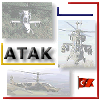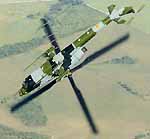|
|
According to unnamed officials quoted in Aviation Weekly and Space Technology, the Apache was removed because it was considered too expensive to maintain and operate, and the Eurocopter was eliminated because of controversy surrounding the German government's displeasure at Turkey's human rights record.
Human rights activists around the world are also concerned with the possible
sale, because of fears that the helicopters could be used for continued repression on Turkey's Kurdish
population. Turkey has
long been criticized for its poor human rights record, and the February, 2000
edition of the State Department's Human Rights report stated that
"Torture, beatings, and other abuses by security forces remained widespread, at
times resulting in deaths." The attack helicopter sale is worth an estimated $4 billion. Initially, the contract will be designed for the sale of 145 helicopters. The total may be reduced to 90 after the first delivery of 50 helicopters is completed and Turkey reassesses its security situation. The first delivery had been scheduled for November 2002, but as a result of the continued delays in making a final decision, the delivery date will likely be pushed back until 2003. The helicopters will be manufactured as a joint venture between the company awarded the contract and Turkish Aerospace Industries (TAI) and will include, therefore, technology transfers as well as the actual helicopters. Before the final decision is made, Turkey has asked companies to provide additional financial and technical details. Turkey has also requested export guarantees for the helicopters. To date, only Russia has been able to provide a letter of guarantee. The United States will be unable to provide such a guarantee because of domestic law -- the Arms Export Control Act -- which requires licensing approval from Congress and the Office of Defense Trade Controls in the State Department. Experts believe that Bell Textron will most likely win the contract. Turkey already has Bell helicopters in its arsenal, and therefore, less additional training of Turkish personnel would be required. Further, Bell has indicated that it will lease 10 Super Cobras to Turkey before the initial deliveries of the King Cobras begin to fill Turkey's immediate need for helicopters. The inclusion of the Agusta and Russian-Israeli helicopters on the short list is seen as a move to put continued pressure on the United States and Bell to ensure the conditions of the sale as Turkey is demanding. Turkey has announced that it will make its final decision on the helicopters at the end of 2000 , both because the Turks want to see the results of the test-flights of the King Cobra in September and the outcome of the U.S. Presidential election in November. (Weekly Defense Monitor) |

 After
months of delays and postponements, the government of Turkey has narrowed its list of
candidates for the purchase of attack helicopters to three companies.
The finalists are: the
United States' Bell
Helicopter Textron AH-1Z King Cobra, Italy's Agusta A-129 International, and the
joint effort of Russia's Kamov and Israel's Israel Aircraft Industries, the Ka-50-2.
Boeing's
AH-64D Apache and the French-German
Eurocopter Tiger were dropped from consideration.
After
months of delays and postponements, the government of Turkey has narrowed its list of
candidates for the purchase of attack helicopters to three companies.
The finalists are: the
United States' Bell
Helicopter Textron AH-1Z King Cobra, Italy's Agusta A-129 International, and the
joint effort of Russia's Kamov and Israel's Israel Aircraft Industries, the Ka-50-2.
Boeing's
AH-64D Apache and the French-German
Eurocopter Tiger were dropped from consideration.